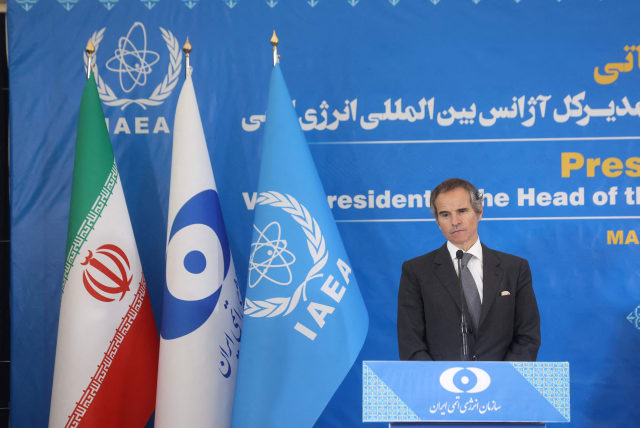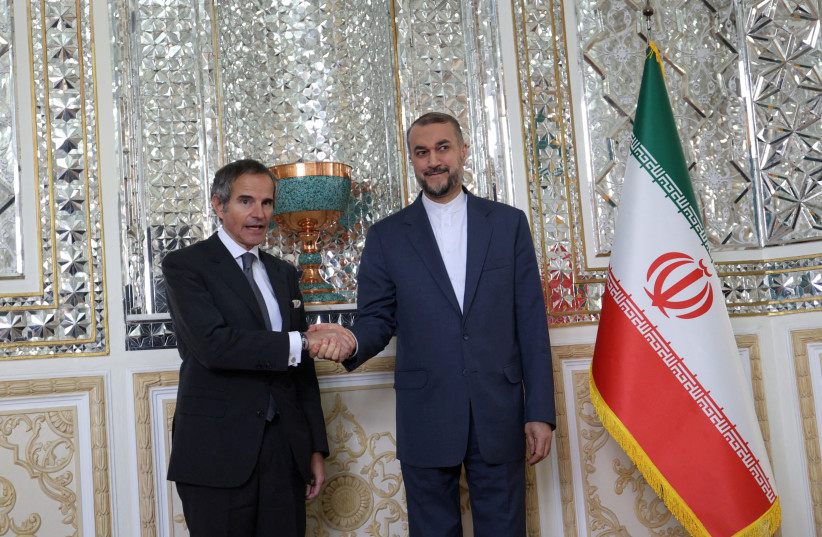Iran pledges to cooperate with IAEA investigation, re-installs cameras

Iran is supposed to provide access to information, locations and people, suggesting a vast improvement after years of Iranian stonewalling.
Iran has given sweeping assurances to the UN nuclear watchdog that it will finally assist a long-stalled investigation into uranium particles found at undeclared sites and even reinstall removed monitoring equipment, the watchdog said on Saturday.
The International Atomic Energy Agency and Iran issued a joint statement on IAEA chief Rafael Grossi’s return from a trip to Tehran just two days before a quarterly meeting of the agency’s 35-nation Board of Governors.
The statement went into little detail but the possibility of a marked improvement in relations between the two is likely to stave off a Western push for a third consecutive resolution at the IAEA board meeting ordering Iran to cooperate, diplomats said. It could also avert United Nations Security Council action.
Iran, however, has made similar promises before that have yielded little or nothing when it had to produce explanations regarding suspicions of prior military dimensions of its nuclear program.
The possibility that Iran might have mellowed in its attitude toward the IAEA comes amid reports that it has uranium enrichment has reached 84%, a level that is very close to 90% weapons-grade enrichment. It’s a level that is only necessary if one is producing nuclear weapons.
The report of its 84% enrichment and its execution of protesters, has swayed European countries and the United States to take firmer diplomatic action against Iran’s nuclear weapons program.
Israel continues fight against nuclear deal
Israel has used this shift in attitude to tighten its alliance with Europe and the US against Iran, as it seeks a common united front. Israel has insisted, in particular, that only a credible military threat can thwart Iran’s nuclear program.
National Security Adviser Tzachi Hanegbi and Strategic Affairs Minister Ron Dermer are expected to visit Washington this week to discuss Iran.
Israel on Friday hosted the top US military officer, Army Gen. Mark Milley, on Friday for discussions that it said included the need for cooperation on denying Iran nuclear weaponry.
Milley made the previously unannounced visit ahead of a trip to Israel by US Defense Secretary Lloyd Austin that will also include neighboring Egypt and Jordan.
“Ongoing cooperation is required in order to prevent Iran from gaining a nuclear weapon,” defense minister Yoav Gallant’s office quoted him as telling Milley, chairman of the US Joint Chiefs of Staff.
Milley made no public remarks in Israel. His representative said Milley discussed regional security issues and “coordination to defend against threats posed by Iran” in his talks with Chief of Staff Lt.-Gen. Herzi Halevi.
Iran's sudden change of tune
On Saturday, Iran gave a nod in the direction of the international community and seemed suddenly ready to cooperate with the IAEA.
“Iran expressed its readiness to... provide further information and access to address the outstanding safeguards issues,” the joint Iranian statement with the IAEA said. A confidential IAEA report to member states seen by Reuters said Grossi “looks forward to... prompt and full implementation of the Joint Statement.”
Iran is supposed to provide access to information, locations and people,
While in Iran Grossi met with President Ebrahim Raisi, as part of his efforts to reach an agreement. Raisi later told reporters on Saturday that the Islamic Republic was enriching uranium up to 60% fissile purity
Grossi told a news conference at Vienna airport soon after returning from his trip that Iran would allow the reinstallation of extra monitoring equipment suggesting a vast improvement after years of Iranian stonewalling.
The equipment that had been put in place under the 2015 Joint Comprehensive Plan of Action nuclear deal but then removed last year as the deal unraveled in the wake of the US withdrawal from the deal in 2018 under then-US president Donald Trump after the Mossad exposed that Iran had been concealing aspects of its nuclear program from the IAEA.
US President Joe Biden’s efforts to revive the deal have faltered and the Biden administration has said it’s not possible at this time to resume negotiations.
Follow-up talks in Iran between IAEA and Iranian officials aimed at hammering out the monitoring details would happen “very, very soon,” Grossi said.
Asked if all that monitoring equipment would be reinstalled, Grossi replied “Yes.” When asked where it would be reinstalled, however, he said only that it would be at a number of locations.
Iran's Atomic Energy Organization spokesperson Behrouz Kamalvandi, however, said Tehran had not agreed to give access to people.
"During the two days that Mr. Grossi was in Iran, the issue of access to individuals was never raised," Kamalvandi told state news agency IRNA, adding there also has been no deal regarding putting new cameras in Iran's nuclear facilities.
Follow-up talks in Iran between IAEA and Iranian officials aimed at hammering out the details would happen "very, very soon," Grossi said.
Asked if all that monitoring equipment would be re-installed, Grossi replied "Yes." When asked where it would be re-installed, however, he said only that it would be at a number of locations.
Yonah Jeremy Bob contributed to this report.
Jerusalem Post Store
`; document.getElementById("linkPremium").innerHTML = cont; var divWithLink = document.getElementById("premium-link"); if (divWithLink !== null && divWithLink !== 'undefined') { divWithLink.style.border = "solid 1px #cb0f3e"; divWithLink.style.textAlign = "center"; divWithLink.style.marginBottom = "15px"; divWithLink.style.marginTop = "15px"; divWithLink.style.width = "100%"; divWithLink.style.backgroundColor = "#122952"; divWithLink.style.color = "#ffffff"; divWithLink.style.lineHeight = "1.5"; } } (function (v, i) { });

